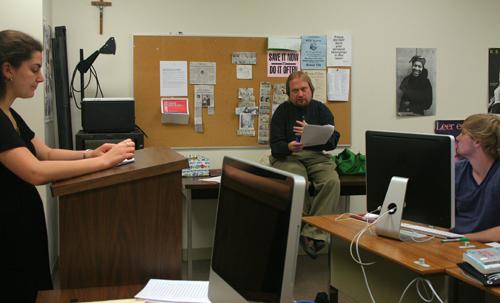The School of Mass Communication is saying farewell to some familiar faces within the faculty; the reason, however, may come as a surprise to some people.
Adjunct professors Les East and Liz Scott won’t be returning to teach journalism courses next fall because they do not meet the standards set forth by the Southern Association of Colleges and Schools’ accreditation board, the governing body that accredits Loyola as an institution.
According to George Capowich, vice provost for Institutional Effectiveness and Research, the School of Mass Communication is the only department at Loyola that has been affected by SACS regulations.
SACS’ Principles of Accreditation handbook states that, “When an institution defines faculty qualifications using faculty credentials, institutions should use the following as credential guidelines … Faculty teaching baccalaureate courses: doctorate or master’s degree in the teaching discipline or master’s degree with a concentration in a teaching discipline.”
East said he disagrees with SACS’ standards for faculty members because he doesn’t think a graduate degree of any sort makes one professor more qualified than another.
“They need to take a broader look at qualifications,” he said. “I understand the need for the university to maintain the accreditation, but I can’t help but wonder about the validity of any evaluation that determines an adjunct is unqualified without ever considering the fact that someone has taught at the university for eight years and received the highest marks from students and faculty alike.”
Capowich said that the school’s accreditation is essential to Loyola’s existence as a university.
“Without accreditation, the degrees we confer are not valid, students are not eligible for federal aid, state support would end, employers would not recognize the validity of degrees earned by students and professional organizations such as the Bar and the agencies that accredit individual programs such as business would not recognize the program,” he said.
Sonya Duhe, director of the School of Mass Communication, said she thinks it’s critical to ensure mass communication’s compliance with SACS standards because the students deserve the highest degree of education.
“This is very good for the students because accreditation means that our peers and this council has said that we have excellence here. Students can’t even apply for some awards if they are not from an accredited school,” Duhe said.
With the School of Mass Communication’s compliance, they will be able to seek accreditation of their own from the Accrediting Council on Education in Journalism and Mass Communication.
“We are doing so many things in a wonderful way here. Even with our own accreditation it requires that there are plans in place,” Duhe said. “We are working very diligently to make sure our house is in order as we begin our own journalism and mass communication process.”
Although SACS requires professors to have a master’s or doctorate degree, it makes certain exceptions for any institution that could give a legitimate justification for a professor without such certification.
East said despite the fact that he doesn’t have a master’s or doctorate degree, his years of teaching experience, 30 years of experience in the journalism industry and award-winning work should deem him qualified and grant him justification.
“I tried to illustrate that my track record and my qualifications should speak for themselves, but apparently that’s not something that falls under the category of special case or something warranting a special exception,” East said.
At the moment, East doesn’t plan on attending graduate school due to conflicts with his freelancing but hasn’t completely ruled the idea out.
“I’ve looked into the possibility of getting a master’s or a doctorate degree to meet that requirement, but at this point, finding which degree to go after, how I can get it, how I can afford it and how to fit it into my freelancing schedule is a pretty tricky calculation I haven’t been able to figure out yet,” East said.
Duhe said she is already taking the necessary steps to replace the professors who won’t be back next fall so that current faculty members won’t have to teach additional courses.
“The professors who have been adjuncts for us have been fabulous. They have been fabulous teachers … my hope is that we will be able to replace them,” Duhe said.
Craig Malveaux can be reached at








